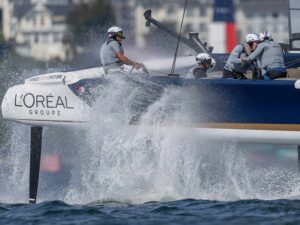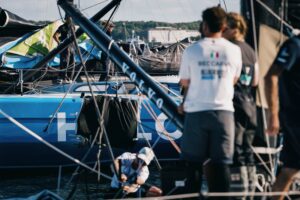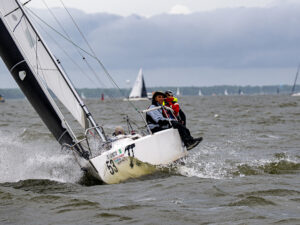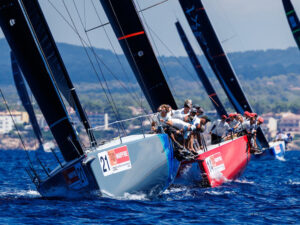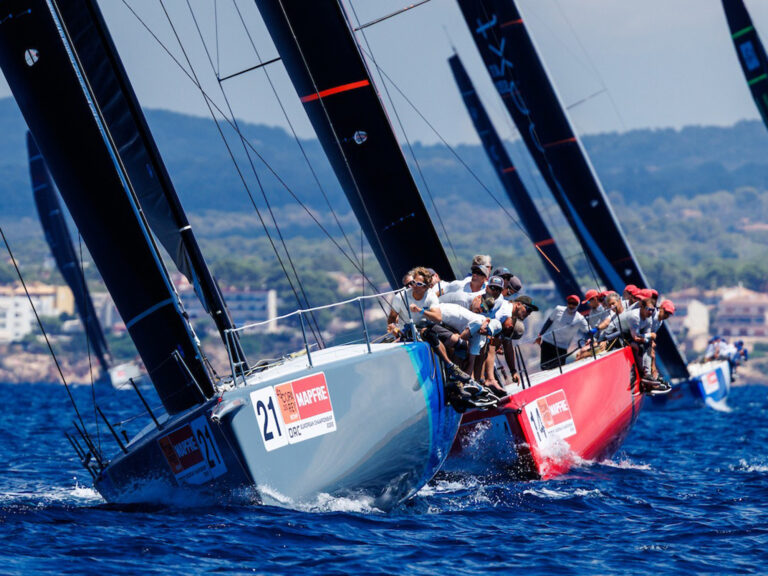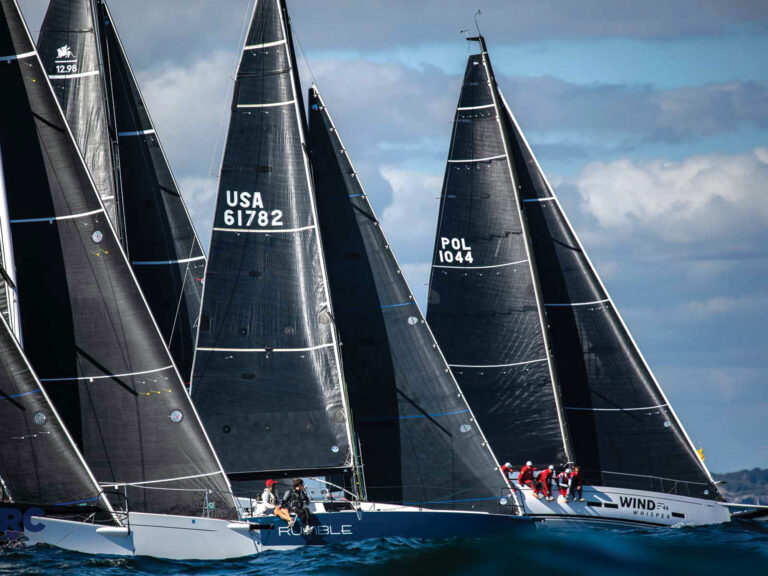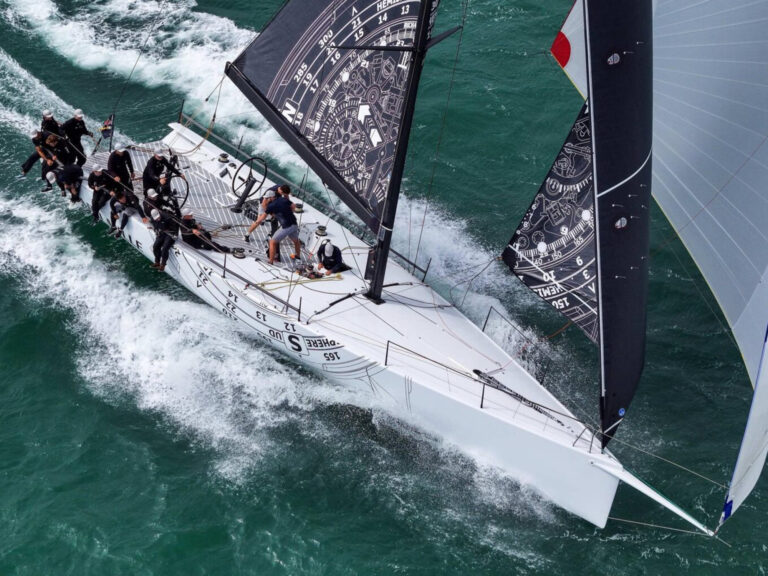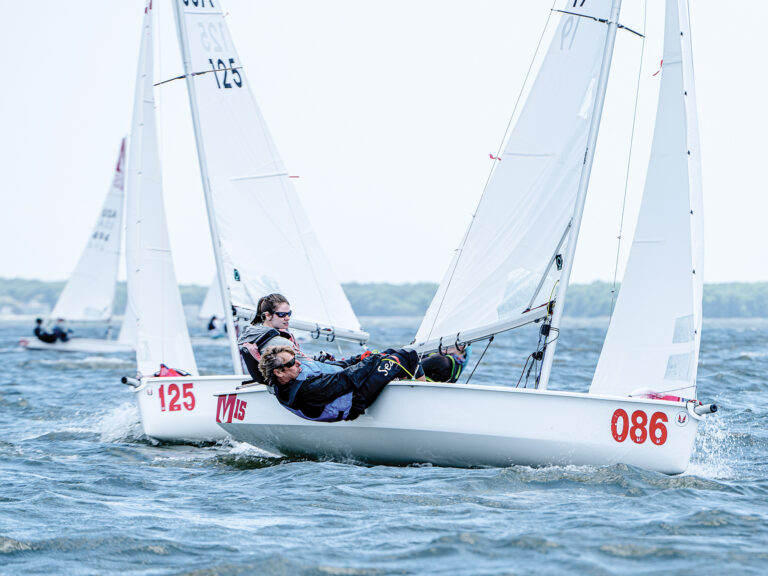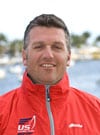
Brenner100
In all of my interviews with Dean Brenner, chairman of U.S. Sailing’s Olympic Sailing Committee, I’ve been amazed at his ability to hold a consistent temperament. He has been positive, but never over the top. He has always expected great things of his sailors, he’s not afraid to call it like it is, but he has been unfailingly supportive. Like a proud father who can some how emotionally detach himself from his children’s performance. Were he an actor, everyone would laud him for never breaking character. And that’s not to say he was forcing it.
Today, moments after the U.S. match racing team of Anna Tunnicliffe, Molly Vandemoer, and Debbie Capozzi were bounced from the quarterfinals of the women’s match racing tournament in the 2012 Olympic Regatta, ensuring that for the first time since 1936 the U.S. Sailing Team won’t take home a medal from the Olympic regatta, I saw a wider range of emotions. It was a subdued interview, Brenner isn’t one to go into hysterics. But he showed frustration with the lack of success. He was protective of his team. He even wiped away a tear.
For eight years, Brenner has stuck to a job description that he largely wrote for himself. He raised as much money as he could, and, when he attended regattas, he did all the grunt work. He’s never shied away from an interview, which led some people to think he seeks the spotlight. While there may be an element of truth to that, I also believe that he felt his job demanded a more open relationship with the press, the fans, and the supporters; and that by being accessible to the media, he took some of the load off the sailors and the coaches.
He put a lot of himself into this job. And this Games was his swan song. His replacement is Josh Adams, a longtime member of the Olympic Sailing Committee, a former Olympic Trials runner up in the 470, and the current publisher of Sail magazine. While much of what Brenner put into place was looking toward 2016 and beyond, it’s hard to imagine he wasn’t hoping the medal count from this year’s team would somehow validate all of his effort over the past eight years.
With the Women’s 470 team eliminated from medal contention—they’ll sail in the medal race on Friday, but can’t do better than fifth—and the women’s match racing team looking at similar ceiling—they’ll sail off for fifth through eighth on Thursday—he’ll have to look elsewhere for validation, or wait four years for Rio.
He’ll also have to be stout in the face of a lot of criticism. Some of it will be warranted, some not.
What do you have to say about this being the first sailing team to not medal in the Olympics since 1936?
Not the distinction this team was going for. There’s no hiding the results. There’s no way to spin it, there’s no way to suggest anything other than we didn’t perform. There’s going to be an enormous amount of discussion—a lot of it is going to be productive, some of it probably won’t be—on what we did wrong, and what we need to do better, and I’m going to lead that discussion with my successor Josh Adams, and we’re going to look very, very closely at our program. But make no mistake about it; we’re not proud of these results at all. We came here thinking we could compete for three or four medals, and we thought the track record suggested that that was legit. It didn’t happen.
How worried are you that in this discussion that some of the things that you’ve done over the last four years that you thought were very productive will get maybe overly scrutinized, or maybe take some of the blame and be compromised going forward?
That’s a perfectly valid question. One of the big things we did was raise more money. I don’t think anyone’s going to say that was a bad thing. One of the other big things that we did was we had to get fitter as a team. I don’t think anybody’s going to say that was a bad thing. One of the things we said was we wanted a more collaborative training culture, and we clearly accomplished that. And I don’t think anybody’s going to say that’s a bad thing. I think those are the pillars of what we’ve really worked on. There are clearly some things in our performance program that need a look. This is sailing, and I’ve been to lot of regattas where I was an athlete, and I was very well prepared and my team didn’t win. It’s possible that this could be over-scrutinized too, and I’m sure it will be. But, I think some things in our performance program are going to need to get a really hard look, and they should. I mean, we didn’t win any medals, and there’s no way to spin that.
You mentioned kind of the ‘team spirit.’ Yesterday, we saw [Iain] Percy down here helping out, Ben Ainslie is still around cheering on Team GB; I know some of the U.S. sailors have gone to London. Yet I didn’t see any team members here to get Anna and her team when they hit the dock?
Most of our team is here. No, that’s not true [that no one was here to greet the Women’s Match Racing team]. Several members of our team were around. We had our whole team arrive together. Our plan for a year was that after everybody’s event was over, everybody was going to get a day or two to go check out London, and we’ve stuck to that schedule, and it has nothing to do with the results. And as planned, the entire team is coming back to de-rig boats together; you’ll still see Zach’s boat rigged over there [in the area where the U.S. kept its boats]. We’re going to de-rig boats together, and we’re going to pack containers together, and we’re going to go to the closing ceremony as a team. We arrived as a team, and we’re leaving as a team. The fact that a couple of people are up in London right now, that was the plan six months ago. And this team is more together than any U.S. team that I’ve ever been around. You mention the British team; I think they’ve done that very, very well. They have a very strong squad culture. I’m not embarrassed to say that we looked closely at what they’ve done there, and tried to emulate some of it. They have a lot to be proud of with their team culture, and we’re trying to build exactly the same thing.
Looking at some of the medal winners in this event there’s a range in how they approached the event. You have Nathan Outteridge, who went out one day after his capsize in a snorkel and a mask on, and is clearly one of the loosest guys in this event. You have other athletes, like Ben Ainslie, for example, who take things very seriously. How do you feel about the balance on the U.S. squad between: ‘This is the Olympics, this is the biggest event,’ and ‘this has to be just like another event’?
I think it’s going to be different for every athlete. I mean, every successful Olympian I’ve ever spoken to—and I’ve spoken to a lot of them—have all said the same thing: “It’s unlike any other event, that you have to treat like any other event.” Everybody says the same thing. And everybody finds their equilibrium on that scale. Every sailor is a little different. You know, you mentioned two great examples. Ben doesn’t treat it like Nathan does; I don’t know them personally, but from the outside looking in. And all of our sailors did it their own way, too, and I think our team was ready. And I’ve been doing a lot of hard thinking about this over the last few days, going class by class. There were some classes going in here that we knew we weren’t going to be competitive in. I mean, that was no surprise. But class by class I felt like we were healthy, I felt like we were fit, and I felt like we were poised for some good results. You know, it didn’t happen.
Do you think this is a four-year turnaround for a 10-year job? Do you think the introduction of new events will perhaps help you catch up?
I actually don’t even think it’s a 10-year turnaround. I think it’s a 20-year turnaround. And things take a lot time. We were listening to the BBC coverage last night, and I can’t remember his name, but there was a British cyclist who just won multiple medals, and he mentioned that there was a plan put in place 15 years ago with British cycling that’s now coming to fruition. I think we’ve seen the same thing with GBR sailing. You know, we put a plan in place. And the pillars of that plan are being put in place one by one. There are a couple of other pillars that we haven’t gotten to yet. We’ve got to work on our pipeline development plan.
The British plan was based on lottery funding. Is it the same kind of deal?
I don’t want to have anybody misinterpret what I’m saying here. I don’t want to minimize any of their great accomplishments. But certainly that’s a competitive advantage. We don’t have that—no other country that I’m aware of has that. But let’s leave that alone. You know, I think the turnaround is underway, and I can tell you that my debrief with our Board of Directors, with our Olympic Sailing Committee, with our athletes, is going to take two tones. One of them is: We’ve got to dig into these results, because it’s completely unacceptable. But I’m also going to firmly state that there are a lot of things in the house that are right. And this isn’t going to change that. One event doesn’t change eight years of progress. You know, you wouldn’t undo a lot of things that we’ve done. I’d like to undo the last two weeks, but you can’t do that. So, I think this is a long-term turnaround, and I think patience is required. And I’m retiring in a month, and I’m very hopeful that the group and US Sailing will stay the course on some things, and then take a hard look on some other things. Sure, the new classes, is that an opportunity? Maybe. Maybe. Olympic sailing is a portfolio of 10 business units, if you will. And you have to make strategic decisions unless you have significant funding to compete on the full portfolio; you have to make your choices on where you’re going to compete. Maybe they’ll make different choices for 2016 for the U.S. Team, I don’t know.

